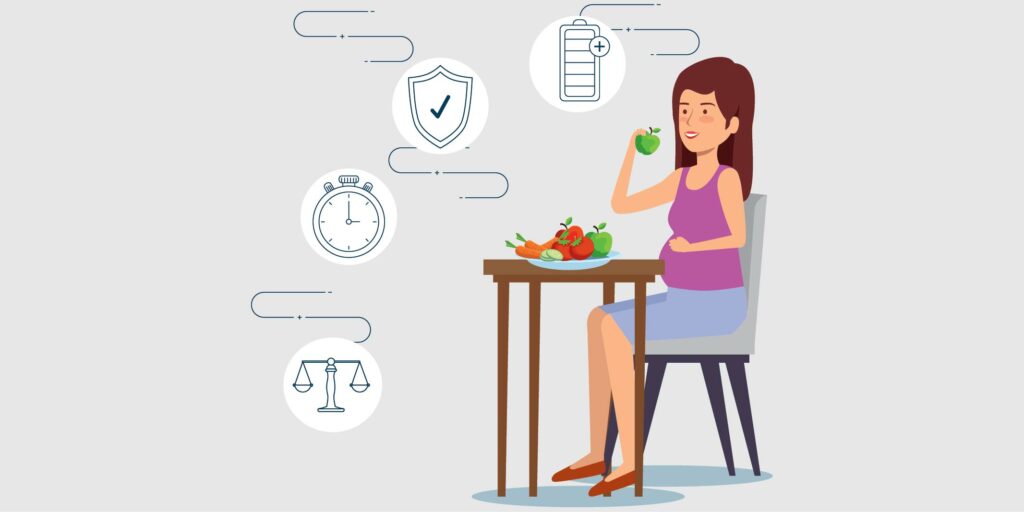Pregnancy marks a significant event in many people’s lives, filled with happiness, excitement, and hopes for a fresh start. However, for others, this route can be filled with distress and sorrow due to miscarriages. Miscarriages can happen for a number of reasons, and while they can be emotionally and physically challenging, diet is essential to support a successful pregnancy. According to the latest review of the literature, eating a lot of fruit, vegetables, seafood, dairy, eggs, and grains throughout the preconception and early stages of pregnancy may lower the chance of miscarriage.
A study by Chung Y, Melo P, Pickering O, et al., published in April 2023 in Fertility and Sterility, found that high fruit consumption compared to low fruit consumption reduced the risk of miscarriage by 61%, while vegetable intake reduced the risk by 41%, dairy intake by 37%, grain intake by 33%, and seafood and egg intake by 19%.
The Power of Nutrient-Rich Foods
Fruits and vegetables contain the richest source of dietary fiber, vital vitamins, minerals, and antioxidants. They offer a wealth of nutrients that are necessary for a healthy pregnancy and can lessen the chance of miscarriages in a number of ways, including:
A high-fiber diet made up of fruits and vegetables helps to keep blood sugar levels constant. Stable blood sugar levels are essential throughout pregnancy since fluctuating blood sugar might raise the risk of miscarriages.
Fruits and vegetables contain vital elements like iron, calcium, and potassium that help maintain a mother’s health throughout pregnancy. It is important to consume these nutrients in sufficient amounts to lower the risk of difficulties that might result in miscarriages.
Benefits of Fruits for pregnant women
Undoubtedly, fruits are superb. They include nutrients including vitamins and minerals that can support the development of your baby during your pregnancy. In order to keep their bodies healthy until the baby is born, pregnant women need to eat foods high in fibre, potassium, vitamin A and C, folic acid, and other nutrients. Fruits can be a great and easily accessible source of these nutrients.
Lemons and oranges are two citrus fruits that are particularly rich in vitamin C. Vitamin C supports your child’s ability to form strong bones. In addition, citrus fruits enhance a pregnant woman’s digestion and fight off morning sickness.
A great source of potassium is bananas. When a woman is pregnant, potassium may substantially help in controlling her body’s fluid and blood pressure, as well as minimizing leg cramps and pain.
In addition to being tasty, kiwis have a high folic acid content. Folic acid actively prevents growth problems in fetuses.
Pomegranates are a great source of nutrition and energy. They also help avoid iron deficiency because of their high iron content.
According to research, eating two pieces of fruit daily lowers the chance of miscarriage by more than 70%. “Fruit reduces levels of androstenedione, a hormone associated with an increased risk of miscarriage.”
Benefits of veggies for pregnant women
The greatest veggies for pregnant women are those that are high in fiber and other nutrients. The key to success is eating the appropriate things at the right times in the right amounts. It will be simpler to prevent nutritional deficits and gestational diabetes with a nutritious diet.
- Beta carotene, which supports the development of the baby’s immune system, eyesight, and muscle
- Vitamin C helps maintain strong teeth and bones as well as healthy tissue growth.
- Folic acid can help people maintain a healthy weight and avoid neural tube abnormalities.
- Potassium, for better control of blood pressure
According to one research, women who consumed at least 14 servings of vegetables each week had a 40% lower risk of miscarriage than those who consumed no more than 7 serves. Half a cup of cooked vegetables or a cup of salad constitute one serve of vegetables.
Conclusion
A diet rich in fruits and vegetables can enhance pregnancy’s health by supplying vital nutrients, hormone balance, and reducing inflammation. However, individual factors and medical conditions also affect miscarriage risk. Consult a healthcare provider for personalized guidance. Nourishing your body with nature’s goodness can boost the likelihood of a healthy, joyful pregnancy and lower miscarriage risk.
